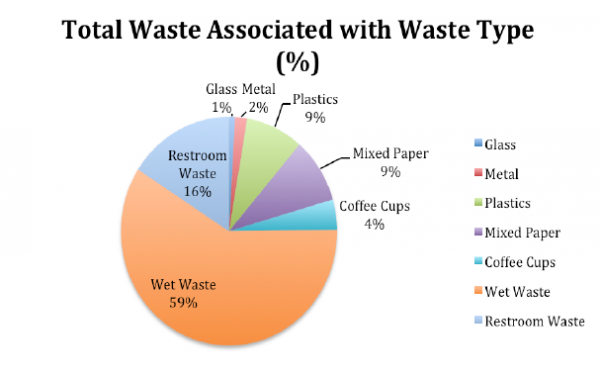Contact the
Office of the Dean
1,016,078
Water bottles diverted from landfills to-date40%
Reduction of water usage with low-flow fixturesMaking an effort towards carbon neutrality

Assistant Dean
Sustainability Lead
Northern Arizona University and Cline Library share a firm commitment to sustainability. Cline Library supports NAU’s strategic plan objective to reduce the impact of the university through environmentally sustainable practices. The library supports this pledge through the utilization of sustainable building practices in multiple realms such as environmentally preferable purchasing, utility use, renovation activities, recycling and waste reduction, transportation, and maintenance.
Educational outreach Accordion Closed
Cline Library always strives to provide access and communication services to students and the community members who visit the library. LCD displays are utilized throughout the library to notify students and visitors of environmentally-friendly behaviors that can be practiced while visiting, and the strides taken by the library to reduce its carbon footprint.
The LCD displays inform visitors of current maintenance and renovation work; especially those intended to increase energy efficiency. Outreach for the library is done outside of the building as well. Library staff are often found tabling at Green NAU events on campus in support of the sustainable initiatives at work across the entire university.
Energy Efficiency Accordion Closed
Between 2012-2015, Cline Library benefited from energy conservation measures implemented through a contract between NAU and NORESCO. An initial energy-use baseline was created for the building so that increased energy efficiency and cost-savings could be analyzed at a later date. This baseline was used to perform a snapshot comparison of the modeled energy use for the library against the energy use associated with another building of similar use and size.
Energy meters were installed on site to allow for real-time tracking of energy use within the building, and the confirmation of the estimated cost savings associated with the recommended energy retrofits. Logs are kept of the building’s current metered energy use.
Cline Library partners with the NAU Office of Sustainability to train library staff as energy mentors. Over twenty-six energy mentors from across the library have pledged to adopt and encourage energy-saving behaviors throughout the building and the entire campus.
Cline Library’s energy mentors are focused on two energy conservation measures (ECMs), ‘Flip the Switch’ and ‘Reduce the Juice.’ These two areas have a positive impact on energy efficiency at Cline Library.
- Encourage the use of natural lighting.
- Turn off desk lamps when possible.
- Turn off the lights when leaving your office.
- Watch out for energy vampires! Unplug electrical devices after powering down.
- Place coffee pots and small appliances in common areas.
- Use a power strip.
Heating and Cooling Accordion Closed
Retrofits and upgrades to Cline Library’s heating and cooling (HVAC) infrastructure began in 2012. Retrofits and upgrades included:
- Installed energy-saving Variable Frequency Drives (VFDs) on 15 air-handling units throughout the building.
- New monitoring controls installed on 154 heat pumps.
- Replacement of HVAC coils: In May of 2014, HVAC coils in the library were replaced. Approximately 1,200 lbs of coils were recycled as part of this renovation work. The HVAC coils, part of the original phase of building construction installed in 1966, had reached their end of life.
Lighting Accordion Closed
Increased energy efficiency through sustainable lighting practices is of particular importance for Cline Library. The size and long hours of operation create a large demand for energy to satisfy lighting needs. During the fall of 2012, NAU installed over 9,000 new T8 lamps and ballasts in the library. These are more energy efficient and last twice as long as the previous lamps.
New lighting control system:
The old system was failing, parts were no longer available, and it provided limited control over extremely large areas of the building. The lights were on in a majority of the building (225,000 square feet) up to 140 hours per week during the regular academic year.
The new system enables greater granularity for lighting controls, allowing the library to keep lights off in unused areas of the building, which should lead to reduced energy consumption.
Occupant Surveys Accordion Closed
Regularly conducting occupant-focused surveys can produce many benefits that allow for the reduction of a building’s environmental impact. Cline Library conducts surveys to determine multiple types of service satisfaction. Occupant surveys enabled us to focus more specifically on the environmental quality of the library building. This feedback may highlight mechanical or comfort issues that have previously gone unnoticed during day-to-day operations.
Sustainable Policies Accordion Closed
The establishment of sustainable building policies aids in the reduction of a building’s environmental impact. Cline Library utilizes NAU’s extensive list of sustainable purchasing, maintenance, and renovation policies.
Waste Accordion Closed
A waste stream audit was conducted for the Cline Library at NAU on October 3, 2014. The waste audit was conducted off-site by staff with the Green NAU Energy Initiative. The waste audit was performed to determine the specific types of materials that make up the waste stream from the audited buildings and to analyze the effectiveness of the current diversion program.
The waste sorted during this audit was collected over a 24-hour period on October 2, 2014, including the landfill and recycling waste stream from the entire building. Batteries and other e-waste collections were excluded from this audit. Landscaping waste was also excluded as it is diverted through a compost stream per NAU grounds. The collection period adequately represents the typical waste stream for the building and provides a reasonable collection amount from which to assess the building set’s waste stream make up and recycling efforts. Janitorial staff for the building followed the typical collection protocol prior to the waste audit.
Diversion efforts for these four buildings currently support:
- Single-stream recycling of paper, metals, and plastics**
- Collection of e-waste (i.e. batteries and other electronics)
Audit Procedure
The waste was taken off-site to the Facility Services building (bldg. 77). The auditors followed the following steps:
1. Weigh incoming waste
2. Sort incoming waste
3. Compile sorted waste
4. Weigh sorted waste
This process was conducted for the landfill waste and recycling waste streams. Categories for sorting included: non-recyclable, bathroom waste, coffee cups, and wet waste; and recyclable paper, metal, glass, and plastic.
The total amount of waste examined during the audit was 194 lbs including the following sub-totals for each waste type:
- 38.25* lbs of waste was successfully diverted for recycling
- 155.75 lbs of waste was sent to the landfill
Water Efficiency Accordion Closed
In 2013, Cline Library underwent a plumbing retrofit. Low-flow toilets and urinals and new domestic plumbing fixtures decreased the water flow rate. On average the original toilet fixtures were consuming over 2.48 gallons per flush (gpf), the new high-efficiency toilets consume on average 1.28 gpf. The original urinals on site consumed an average 1.26 gpf. The new high-efficiency urinals consume only 0.125 gpf. Since the installation of the low-flow fixtures, the library’s water usage has reduced by 40%.
Water Bottle Refill Stations
In response to student requests, Cline Library replaced its aging water fountains with ten combination water bottle fill station water fountains. This project was jointly funded by the NAU Green Fund and NAU Facility Services deferred maintenance dollars. Installation was completed in June 2015. Each bottle-fill station can defer at least 20,000 single-use water bottles from landfills annually. Due to the library’s heavy foot traffic of 500,000+ annual visitors, we expect to defer 100,000 single-use water bottles annually.

